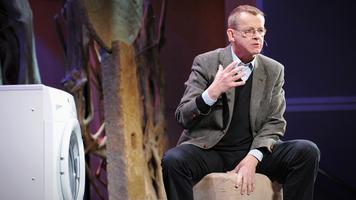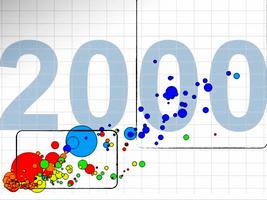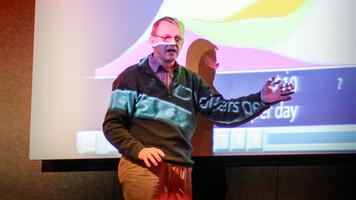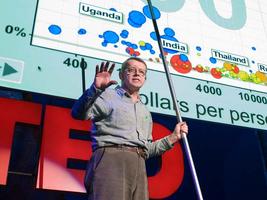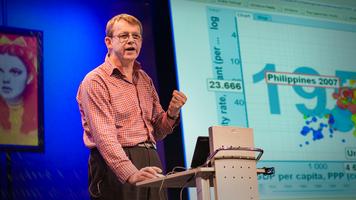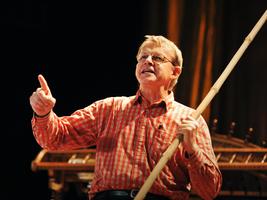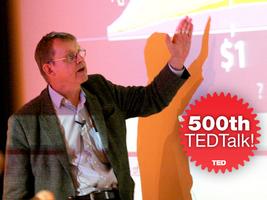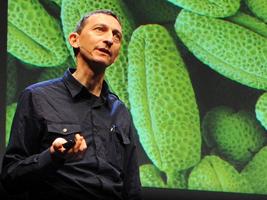Peter Haas: When bad engineering makes a natural disaster even worse
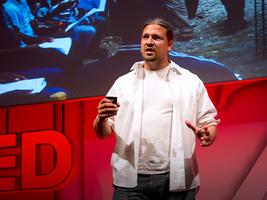
What did the world learn from the devastating earthquake that struck Haiti in 2010? That shoddy buildings and bad planning can make a terrible situation even worse. "Haiti was not a natural disaster," says TED Fellow Peter Haas. "It was a disaster of engineering." The solution: Help builders on the ground get trained in modern engineering practi...
Harald Haas: Wireless data from every light bulb
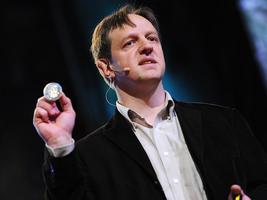
What if every light bulb in the world could also transmit data? At TEDGlobal, Harald Haas demonstrates, for the first time, a device that could do exactly that. By flickering the light from a single LED, a change too quick for the human eye to detect, he can transmit far more data than a cellular tower -- and do it in a way that's more efficient...
Haas&Hahn: How painting can transform communities

Artists Jeroen Koolhaas and Dre Urhahn create community art by painting entire neighborhoods, and involving those who live there -- from the favelas of Rio to the streets of North Philadelphia. What's made their projects succeed? In this funny and inspiring talk, the artists explain their art-first approach -- and the importance of a neighborhoo...
Harald Haas: Forget Wi-Fi. Meet the new Li-Fi Internet
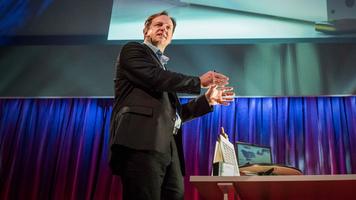
What if we could use existing technologies to provide Internet access to the more than 4 billion people living in places where the infrastructure can't support it? Using off-the-shelf LEDs and solar cells, Harald Haas and his team have pioneered a new technology that transmits data using light, and it may just be the key to bridging the digital ...
Meghan Hussey: 4 ways to design a disability-friendly future
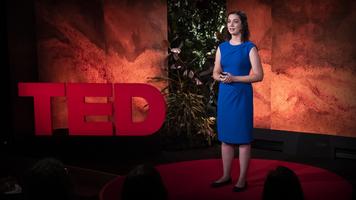
Nearly fifteen percent of the world's population lives with a disability, yet this massive chunk of humanity is still routinely excluded from opportunities. Sharing her experience growing up with an autistic sister, disability inclusion advocate Meghan Hussey illuminates the path towards an inclusive future in four steps, and it starts with an a...
His Holiness Pope Francis: Our moral imperative to act on climate change -- and 3 steps we can take (English voiceover)
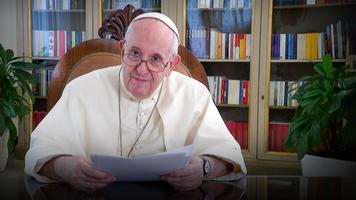
The global climate crisis will require us to transform the way we act, says His Holiness Pope Francis. Delivering a visionary TED Talk from Vatican City, the spiritual leader proposes three courses of action to address the world's growing environmental problems and economic inequalities, illustrating how all of us can work together, across faith...
His Holiness Pope Francis: Why the only future worth building includes everyone
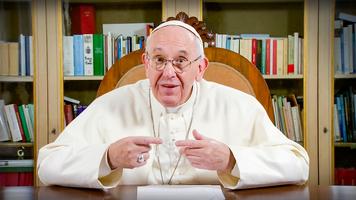
A single individual is enough for hope to exist, and that individual can be you, says His Holiness Pope Francis in this searing TED Talk delivered directly from Vatican City. In a hopeful message to people of all faiths, to those who have power as well as those who don't, the spiritual leader provides illuminating commentary on the world as we c...
His Holiness the Karmapa: The technology of the heart
His Holiness Pope Francis: Our moral imperative to act on climate change -- and 3 steps we can take

The global climate crisis will require us to transform the way we act, says His Holiness Pope Francis. Delivering a visionary TED Talk from Vatican City, the spiritual leader proposes three courses of action to address the world's growing environmental problems and economic inequalities, illustrating how all of us can work together, across faith...
Hans Rosling: The magic washing machine
Hans Rosling: The good news of the decade? We're winning the war against child mortality
Hans Rosling: The best stats you've ever seen
Hans Rosling: Global population growth, box by box
Hans Rosling: Insights on HIV, in stunning data visuals
Hans Rosling: Religions and babies

Hans Rosling had a question: Do some religions have a higher birth rate than others -- and how does this affect global population growth? Speaking at the TEDxSummit in Doha, Qatar, he graphs data over time and across religions. With his trademark humor and sharp insight, Hans reaches a surprising conclusion on world fertility rates.
Hans Rosling: New insights on poverty
Hans Rosling: Asia's rise -- how and when
Hans Rosling: Let my dataset change your mindset
Jac de Haan: Why do competitors open their stores next to one another?
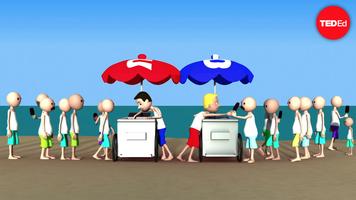
Why are all the gas stations cafes and restaurants in one crowded spot? As two competitive cousins vie for ice-cream-selling domination on one small beach, discover how game theory and the Nash Equilibrium inform these retail hotspots. [Lesson by Jac de Haan, directed by Luke Rowsell, narrated by Jac de Haan].
Hans and Ola Rosling: How not to be ignorant about the world
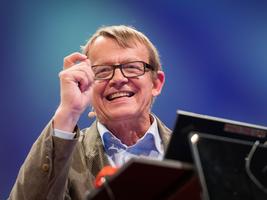
How much do you know about the world? Hans Rosling, with his famous charts of global population, health and income data (and an extra-extra-long pointer), demonstrates that you have a high statistical chance of being quite wrong about what you think you know. Play along with his audience quiz — then, from Hans’ son Ola, learn 4 ways to quickly g...
Thomas W. Cronin: Which animal has the best eyesight?

The animal kingdom boasts an incredible diversity of eyes. Some rotate independently while others have squiggly-shaped pupils. Some have protective lids, others squirt blood. But which creature has the best sight? Which sees best in the darkness? Which sees the most detail? Which animal sees the most color? And finally, which detects motion the ...
Jonathan Drori: Every pollen grain has a story
After Hours: Has Apple peaked? Plus, celebrities changing Hollywood
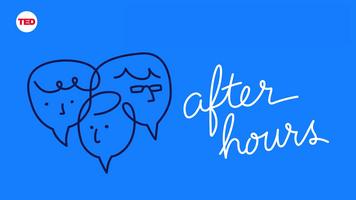
It's been 10 years since the death of Steve Jobs. Has Apple peaked after 10 years of Tim Cook's leadership, or is the best yet to come? Harvard Business School professors Youngme Moon, Felix Oberholzer-Gee and Mihir A. Desai debate the prospects for Apple -- and discuss the celebrities changing the way Hollywood does business, including Reese Wi...
Heather C. McGhee: Racism has a cost for everyone
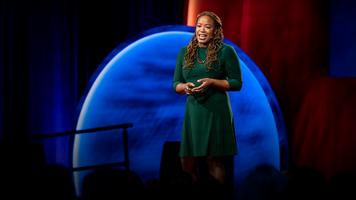
Racism makes our economy worse -- and not just in ways that harm people of color, says public policy expert Heather C. McGhee. From her research and travels across the US, McGhee shares startling insights into how racism fuels bad policymaking and drains our economic potential -- and offers a crucial rethink on what we can do to create a more pr...
Nicos Marcou: Work has changed. Why haven't resumes?
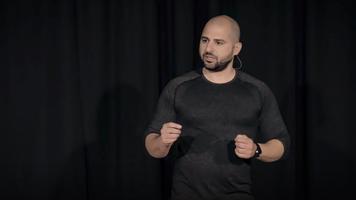
Resumes are a mainstay of the job application process — despite little evidence that they actually help job-seekers or employers get what they want. So why are we still so preoccupied with them? HR leader Nicos Marcou dives into the absurdity of these one-page documents (or can they be two pages?) and offers an update on how companies should thi...
Hans Block and Moritz Riesewieck: The price of a "clean" internet
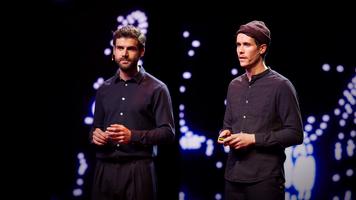
Millions of images and videos are uploaded to the internet each day, yet we rarely see shocking and disturbing content in our social media feeds. Who's keeping the internet "clean" for us? In this eye-opening talk, documentarians Hans Block and Moritz Riesewieck take us inside the shadowy world of online content moderators -- the people contract...
Jakob Christensen-Dalsgaard: These animals can hear everything
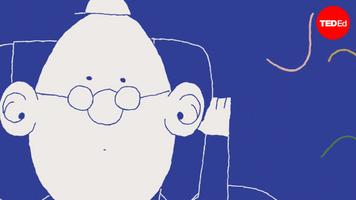
The world is always abuzz with sounds, many of which human ears simply can’t hear. However, other species have extraordinary adaptations that grant them access to realms of sonic extremes. And some of them don’t even have ears— at least, not like we typically imagine. So, which is the best listener? Jakob Christensen-Dalsgaard explores the audit...
Stephanie Honchell Smith: Has there ever been a good dictator?
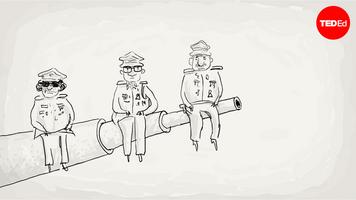
Under certain conditions, the idea of a dictator can sound appealing, like when a democracy isn’t functioning as it should due to corruption or political polarization. People may believe the solution is a "benevolent dictator"— a leader who only uses their absolute power for the common good. But can such a leader actually exist in today’s world?...
Dambisa Moyo: Economic growth has stalled. Let's fix it
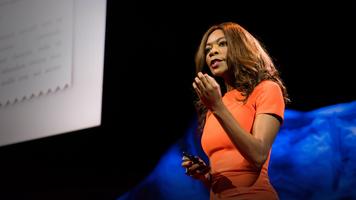
Economic growth is the defining challenge of our time; without it, political and social instability rises, human progress stagnates and societies grow dimmer. But, says economist Dambisa Moyo, dogmatic capitalism isn't creating the growth we need. As she shows, in both state-sponsored and market-driven models, capitalism is failing to solve soci...
Natsai Audrey Chieza: Fashion has a pollution problem -- can biology fix it?
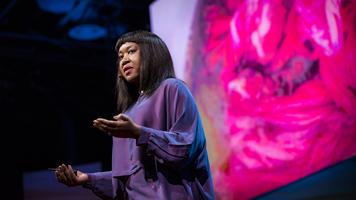
Natsai Audrey Chieza is a designer on a mission -- to reduce pollution in the fashion industry while creating amazing new things to wear. In her lab, she noticed that the bacteria Streptomyces coelicolor makes a striking red-purple pigment, and now she's using it to develop bold, color-fast fabric dye that cuts down on water waste and chemical r...

